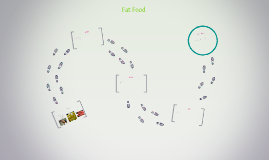Fat Presentation
Transcript: A 1964 study conducted by the Vermont College of Medicine had volunteers in a men's prison gain 15-25% of their body weight. To do so, the men had to eat 8,000-10,000 calories a day; at the study's conclusion, the men all lost the weight rapidly. The Obesity Paradox THANK YOU! Questions/Comments The words "fat," "thin," and "straight sized." Body Mass Index, commonly referred to as BMI, is a measure of a person's height:weight ratio. While commonly misused as an indicator of health, the ranges are arbitrary, and not indicative of a person's health. However, it is at the moment the only tool used to differentiate body types and weight classes. Notable Quotes Modern fat phobia emerged in America during the 1800s in response to industrialization and globalization, but its broad cultural appeal rested largely on racism and white supremacy. "Scientists" categorized people into social hierarchies based on their distinguishing physical characteristics. They placed white European body types on top, including thinness, and other ethnicities on the bottom, including relative fatness. As a result, white people needed to maintain thinness in order to keep their social superiority. Today, fat people make less money, are systemically discriminated against, and are harassed constantly Furthermore, fatness isn't seen as a feminist issue; because of the pervading myths that weight is a choice, it's socially acceptable to harass and bully fat people. Fun fact: as of February 14th, 2016, every player on the Denver Broncos would have a BMI greater than 30- which falls into the "obese" range. Intersectionality Life in a Fat Body On Twitter: @kivabay, @yrfatfriend, @Ok2BeFat, @Artists_Ali, @fatgirlfreedom, @rgay, @upstairsinmysox [mine] To read: Fat Shame by Amy Erdman Farrell; Tipping the Scales of Justice: Fighting Weight Based Discrimination by Sondra Solovay; Rethinking Thin by Gina Kolata, Hunger (and other books) by Roxanne Gay Presented to you by Prince “I'm definitely much happier when I'm thin” “My friends have let me know when they are concerned that I am putting on weight (and also when they are frightened if I get too skinny” "Every time I see a doctor [for depression] they just tell me to lose weight. Every fucking time. I went unmedicated for 21 years." "When I was 12, I was dubbed "morbidly obese" because I had an undetected health problem (that [my doctor], mind you, did not detect until later) and blamed all of my problems on that and how I didn't care about my health." "I hate when people say things because they're "worried about you," no, you're not, you just are grossed out. Don't tell me I need to be thin for someone to love me because now I believe it and this is very hard to come back from." "Most of the ridicule I receive about my weight comes from my mother. ... my mother has often guilted me by saying how happy/proud she’d be if I just lost weight. ... My body image keeps me from making connections with people, and I’m afraid if I don’t find the confidence in me, I’m probably just gonna end up alone." Before we begin Race, Gender, and Class Sources & Further Reading The Survey Mythbusters People in the "overweight" and "obese" BMI ranges live longer than people in the "normal" and "underweight" ranges, even when accounting for all other factors A 2007 study lead by Dr Heinz Buettner, head of interventional cardiology at Herz-Zentrum, Krozingen, Germany, followed 1,676 patients over three years. They had all suffered a cardiac event, but as BMI increased, patient mortality decreased. "9.9% of normal BMI patients and 7.7% of overweight patients had died at the end of the three years, but only 3.6% of obese patients had died and no very obese patients had died." Does this mean people should go out and try to gain some weight ASAP? Well, chances are, you would be unable to. Set point theory is a weight theory that states the body has a range of around 15lbs that it tries to stay in. I conducted a small, informal survey asking friends, family, and strangers on the internet questions about the life in their bodies Approx. 75% of responders considered themselves to be fat 100% have tried dieting to lose weight; 80% either never lost the weight, gained it back, or gained more weight than they lost When asked about self confidence on a scale of 1-10, the median response was a 4 Most reported being harassed about their weight or their food choices, especially by family members "Don't you realize being fat is unhealthy??" Weight is only unhealthy in the most extreme cases (e.g., being so underweight your organs are shutting down; fatness that causes immobility) A sedentary lifestyle is unhealthy: not exercising enough, not getting the right nutrients, eating a lot of processed food However, this is NOT what determines your weight! Weight is influenced by a multitude of factors, including: genetics, medication, underlying health issues, cyclical starving, stress, and even the decade you live in. According to a 2016

















